----
----
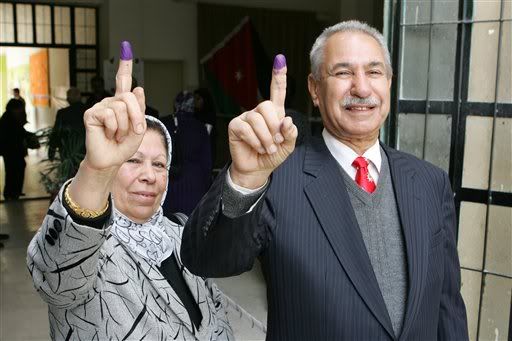
An Iraqi man and his wife shows the indelible ink on thier fingers after casting their votes at a polling center at the start of a three-day Iraqi balloting, in Amman, Jordan, Friday, March, 5, 2010. Iraqis flocked into polling stations across the Jordanian capital and three other provinces at the start of a three-day balloting organized by Iraq's Independent High Electoral Commission in Jordan.
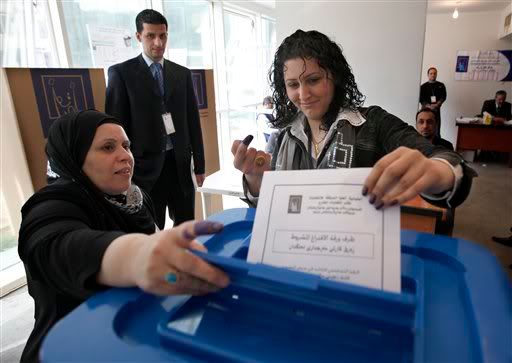
An Iraqi woman casts her vote at a polling center at the start of a three-day Iraqi balloting, in Amman, Jordan, Friday, March, 5, 2010. Iraqis flocked into polling stations across the Jordanian capital and three other provinces at the start of a three-day balloting organized by Iraq's Independent High Electoral Commission in Jordan.
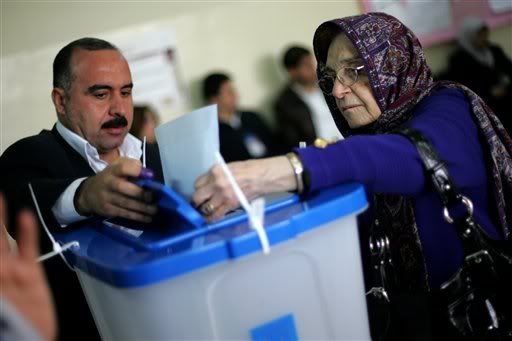
An Iraqi woman casts her vote at a polling center at the start of a three-day Iraqi balloting, in Amman, Jordan, Friday, March, 5, 2010. Iraqis flocked into polling stations across the Jordanian capital and three other provinces at the start of a three-day balloting organized by Iraq's Independent High Electoral Commission in Jordan.
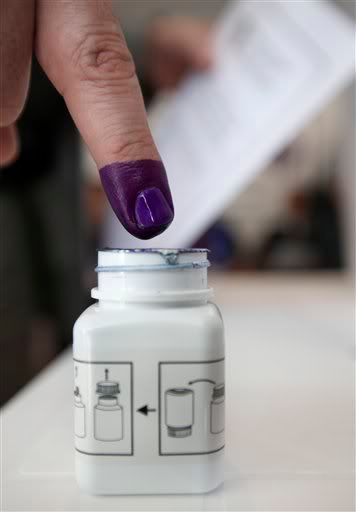
An Iraqi man, inks his finger after casting his vote at a polling center in Beirut, Lebanon, on Friday March 5, 2010. Iraqis living abroad have began casting ballots in their homeland's crucial parliamentary elections. The United Nations refugee agency estimates that around 2 million Iraqis are living abroad after fleeing since the 2003 U.S.-led invasion
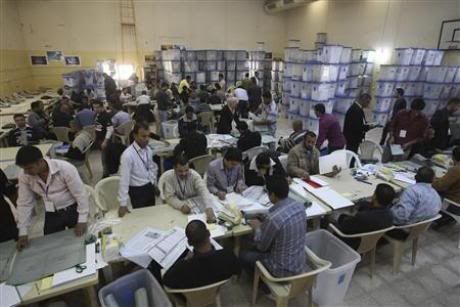
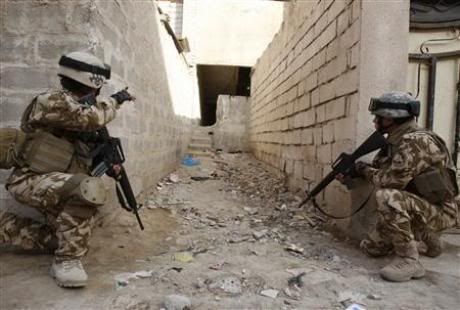
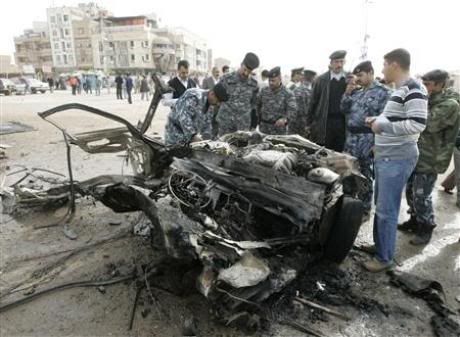
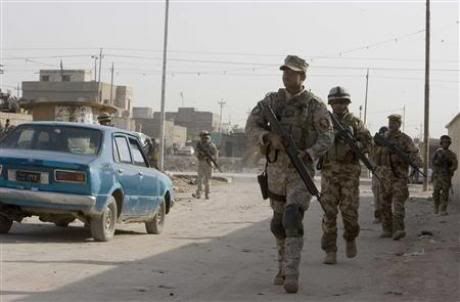

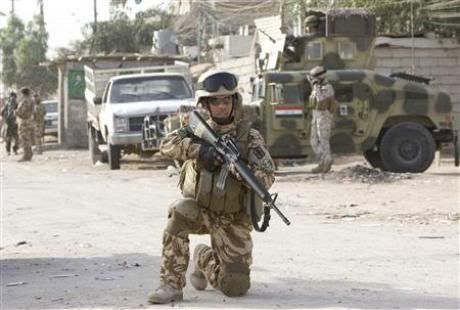
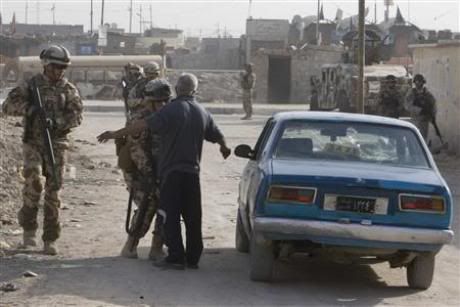
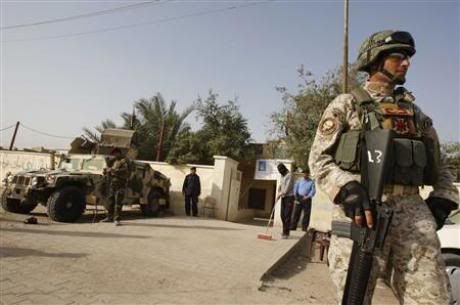
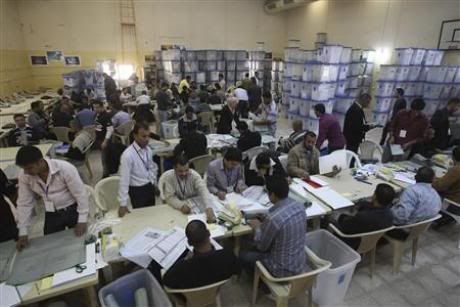
A car bomb killed four Iranian pilgrims near Iraq's holiest Shi'ite shrine on Saturday, a day before a parliamentary election that Sunni Islamist insurgents have vowed to wreck.
The blast gutted two tour buses parked near the Imam Ali shrine in Najaf, which draws millions of pilgrims from Iraq and Iran each year. Salim Nema, a Najaf health official, said the attack wounded 54 people, including 17 Iraqis and 37 Iranians.
At least 49 people have been killed in the last few days of campaigning, some of them soldiers and police voting early.
Sunday's election is a test for Iraq's young democracy, and will help decide whether the country can avoid relapsing into violence as U.S. forces prepare to withdraw by the end of 2011.
Prime Minister Nuri al-Maliki's bid to win a second term on a platform of providing services and security is under challenge from former Shi'ite partners and from a cross-sectarian, secularist group headed by former Prime Minister Iyad Allawi.
Insurgents have warned Iraqis, especially minority Sunni Arabs dominant under Saddam Hussein, to stay at home on Sunday. Sunni militants say the vote will solidify power for Shi'ite factions they see as hostile, heretical and unfit to rule.
Iran, which has close ties to many Shi'ite and other Iraqi parties, condemned the Najaf bombing as "murderous and inhuman."
U.S. ambassador Chris Hill said this week's attacks in Najaf, Baghdad and elsewhere would not deter Iraqi voters.
"Overall we believe the security issues are not driving the political issues; that is, the people are going to be out there voting and we believe, so far so good," he told Reuters during a stop-off at a U.S. military base in the northern city of Mosul.
DECISIVE OUTCOME UNLIKELY
No clear winner may emerge from the election, setting the scene for lengthy negotiations to form a coalition government and perhaps making Iraq vulnerable to renewed conflict.
United Nations Secretary-General Ban Ki-moon urged all Iraqis to vote. "The peaceful conduct of these elections is of paramount importance and should contribute to national reconciliation in Iraq," he said in a statement in New York.
The election is unfolding as global investors weigh opportunities in Iraq, which has the world's third largest oil reserves but is also desperate to diversify a shattered economy.
Overall violence in Iraq has fallen sharply, despite some devastating suicide bombings in Baghdad since August.
"Nationwide attacks remain at their lowest levels since before January 2004," said the chief U.S. military spokesman in Iraq, Major General Steve Lanza, in a statement.
He said attacks had dropped more than 90 percent since the United States ramped up its military presence in June 2007 -- one of several factors that combined to tamp down violence.
Some Sunni tribes and ex-insurgents turned against al Qaeda, an anti-U.S. Shi'ite militia stopped fighting, and sectarian carnage subsided after hundreds of thousands of people fled their homes in previously mixed neighborhoods.
Iraqi President Jalal Talabani acknowledged in a televised speech on Friday that his country's path to democracy had not been "paved with flowers," calling the election another test.
"We all must prove to ourselves and the whole world that we will not abandon this course," the veteran Kurdish leader said.
Campaigning officially ended on Friday. Millions of Iraqis will go to the polls from 7 a.m. on Sunday amid heavy security, including a vehicle ban aimed at preventing car bombings.
Around 600,000 people have already voted inside Iraq, mostly soldiers, police, detainees, hospital staff and patients, while another 1.4 million Iraqi refugees and expatriates were eligible to cast ballots early in 16 foreign countries, officials said.
The blast in Najaf, where authorities hope religious tourism will buttress rebuilding and growth, blew out windows of nearby hotels and left a meter-wide crater in the pavement. Iranian women visiting when the bomb went off wailed nearby.
"These are Saddamists who hope to prevent transparent democracy in Iraq. Even if all Iranians here today had been martyred, we would still come to Najaf," said Iranian pilgrim Ahmed Rafi.
Accustomed to bloodshed after seven years of violence, some Iraqis, such as shopkeeper Jabbar Radhi, struck a defiant tone.
"Nothing will shake us, not killings, not explosions."
Thousands of Iraqis living abroad lined up at polling stations to cast ballots in their homeland's crucial parliamentary elections Friday, a constituency Iraq's Sunni Arab minority hope will boost their showing.
Voting was being held in 16 countries across the globe, from neighboring Syria and Jordan, which are home to the largest Iraqi expatriate communities, to Australia and the United States.
The United Nations refugee agency estimates that around 2 million Iraqis are living abroad — the majority of whom fled violence following the 2003 U.S.-led invasion.
A large proportion of those — particularly in Jordan and Syria — are Sunni Arabs who fled the fierce wave of sectarian killings at the height of the Iraq war.
That has made their votes a major focus of attention for Sunni leaders in Iraq, who are hoping a solid turnout among their community will counterbalance a strong vote among the Shiite majority for their own religious parties.
Voting abroad will be held for three days, while in Iraq most voters go to the polls on Sunday, choosing a 325-seat legislature. The largest bloc in parliament will try to put together a government to lead Iraq for four key years as U.S. troops withdraw.
In Jordan, a Sunni tribal leader from the western Iraqi province of Anbar, Saad Al-Hardan, warned that after the Americans leave, Iran will try to dominate Iraq — a common fear among Sunnis because of the deep ties between Iraqi Shiite parties and Tehran.
"The U.S. occupation will end, but the Iranian one is there to stay. The Iranian influence is significant in parliament and in the government," he said.
Many of those voting said they wanted liberal and secular politicians to take over from Shiite Prime Minister Nouri al-Maliki, who many Sunni Muslims accuse of isolating Sunnis.
Al-Maliki's government "hasn't done anything for Iraq," said Samir al-Abdali, 56, who voted with his wife and daughter at a polling center in Damascus, one of 23 stations in Syria.
He said he voted for Iraqiya, a secular list that includes both Shiites and Sunnis. Among its leaders are Sunni Vice President Tariq al-Hashemi and former Prime Minister Ayad Allawi, a secular Shiite.
In Amman, Amal Janabi, a 39-year-old Sunni who worked at Iraq's agriculture ministry for seven years until she fled to Jordan after the invasion, said she too voted for Allawi's Iraqiya.
"He's a secular leader and his list comprises all Iraqi sects," said Janabi, in a Western-style black suit and a conservative Muslim headscarf. "He will be able to cut across the sectarian divide and restore peace and security."
Syria has nearly 800,000 Iraqi refugees, while Jordan's community is estimated as high as 500,000, according to the UNHCR.
The head of the Iraqi election commission in Amman, Nehad Abbas, said turnout out Friday was good. He expects around 180,000 Iraqis in Jordan to cast their ballot.
Voting seemed slower in Lebanon, home to around 50,000 Iraqis.
In the U.S., Haider al-Khasali, 39, said he would like to see al-Maliki stay on as prime minister because "he is a good man and he respects the people, the law."
"But maybe he need more time because Saddam Hussein's Baath party is still working in Iraq," al-Khasali said after voting in Nashville, Tenn.
The issue of out-of-country voting nearly derailed the election when al-Hashemi vetoed an early version of the election law because he said it did not treat votes by Iraqi expatriates as equal to those within the country. The issue was eventually resolved but highlighted just how important Sunnis view expatriate voting.
On Friday, the final day of campaigning in Baghdad, al-Maliki touted the Iraqi-U.S. security pact requiring all American troops to leave by the end of 2011 his government's "most important achievement."
Also, election commission member Hamdiya al-Hussaini said that 600,000 people had cast their ballots Thursday in early voting across Iraq. Those who took part included security officials, detainees and medical workers and others who might not be able to get to the polls Sunday.
The early vote was marred by a string of deadly blasts that killed 17 people, highlighting the fragile nature of the country's security gains.
Despite possible election violence and further turmoil afterward as politicians haggle over a new government, U.S. Secretary of State Hillary Rodham Clinton said Friday the U.S. sees no reason for now to adjust its timetable to bring troops home.
"We do not believe there is any basis that we're aware of for not following through on our withdrawal plans," she told reporters in Guatemala City, Guatemala.
Among the refugee communities in Syria and Lebanon are known to be some prominent tribal sheiks once accused of aiding Iraq's bloody insurgency and members of Saddam's dissolved Baath party.
Zuhair Abdullah, a former Baathist now in Syria, blasted the elections as "illegal and illegitimate because they are conducted under the U.S. occupation." Still, he said he would participate to support what he called "nationalists" over the "sectarians."
Voting also started Friday in the United States, Canada, Australia, Austria, Sweden, Germany, Britain, Denmark, Holland, Iran, the United Arab Emirates, Egypt and Turkey.





0 comments:
Post a Comment